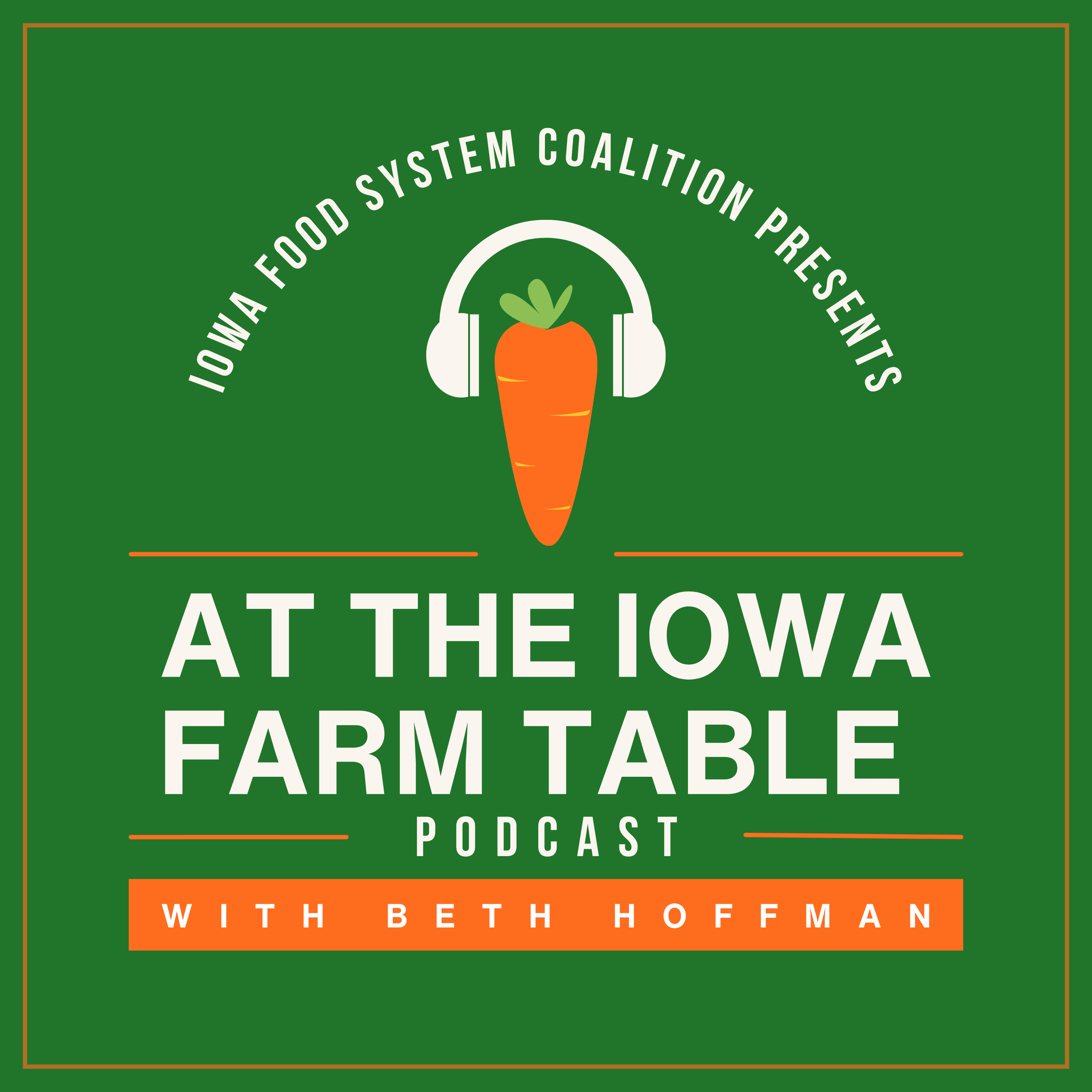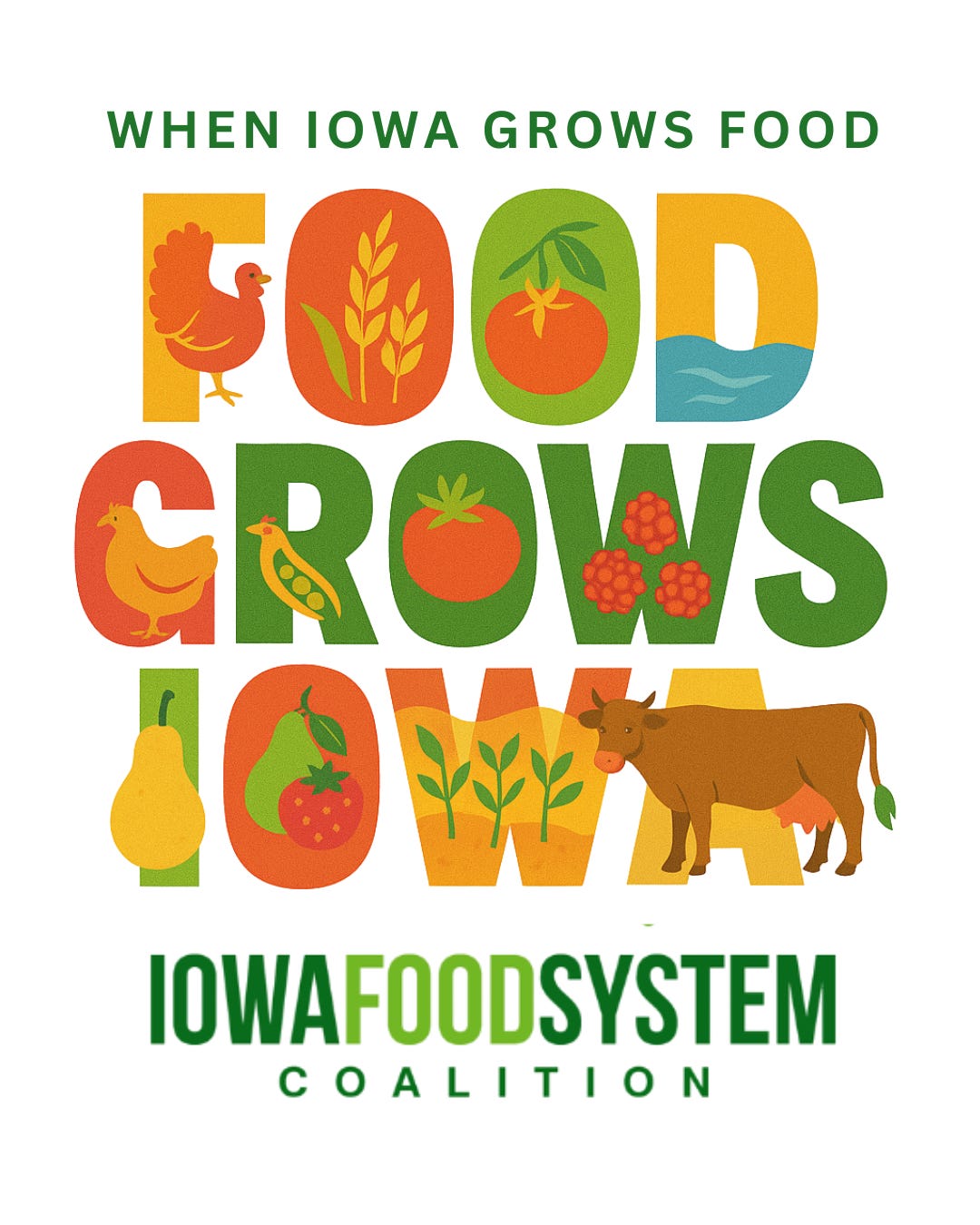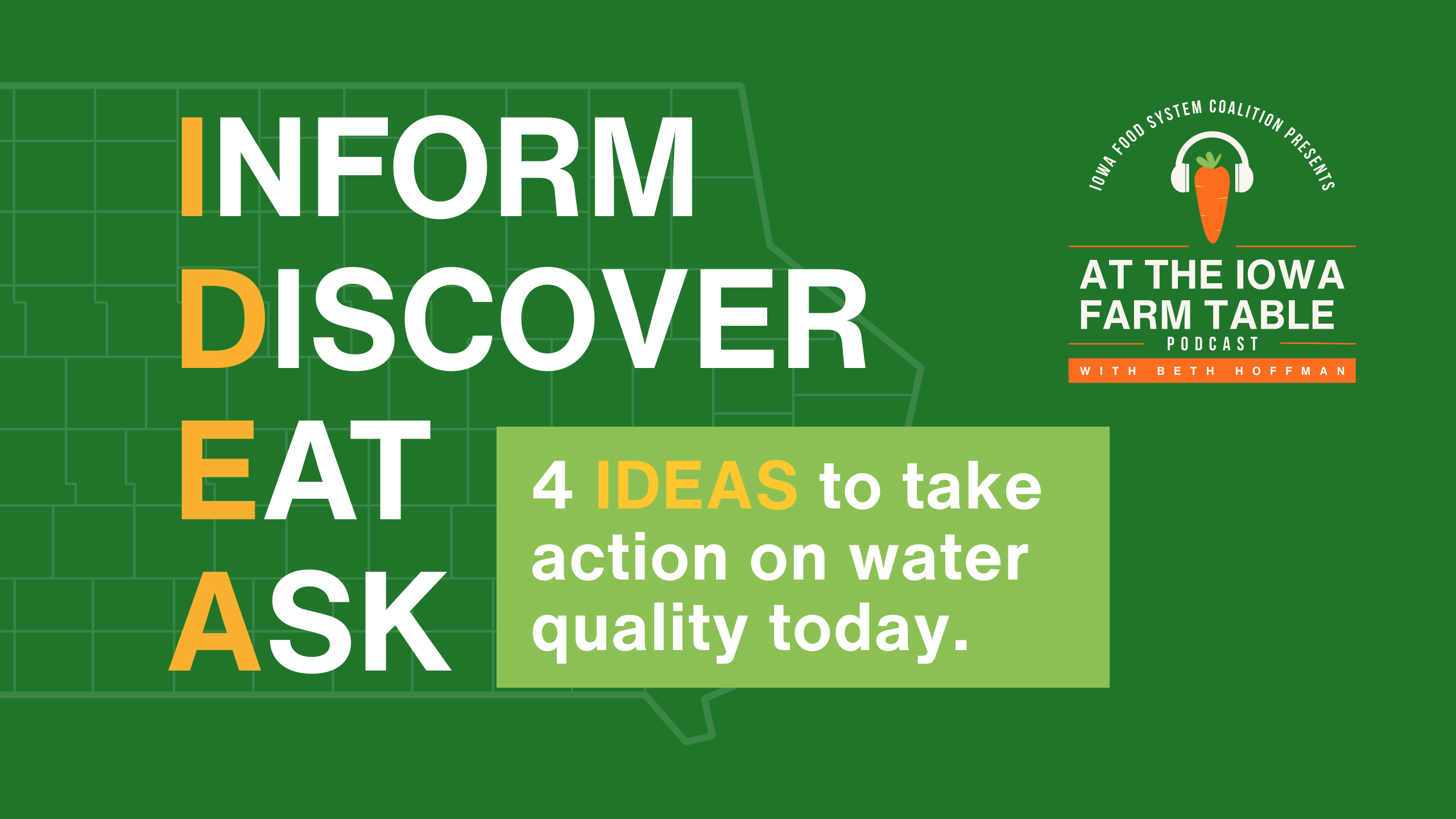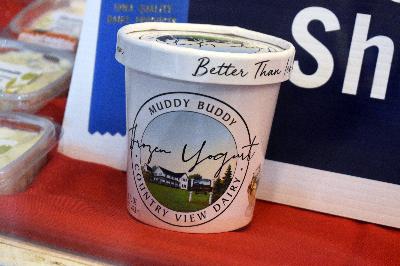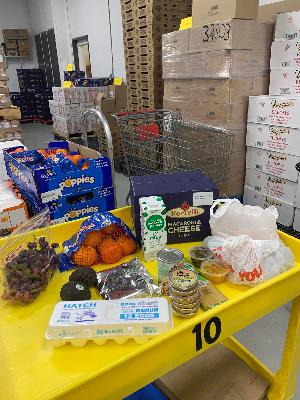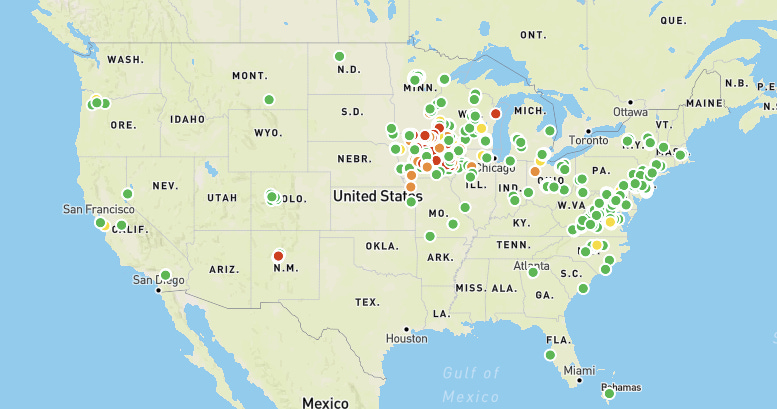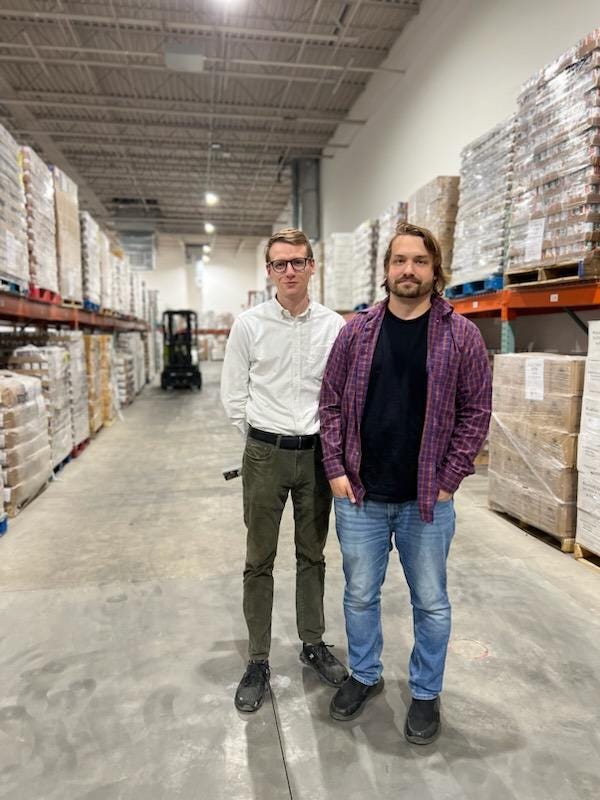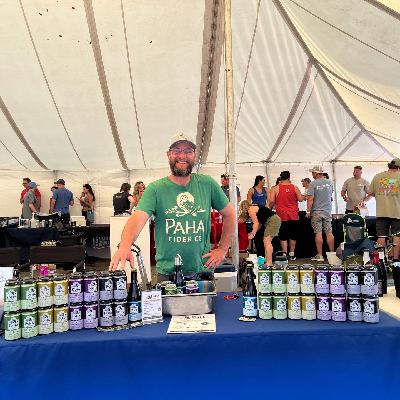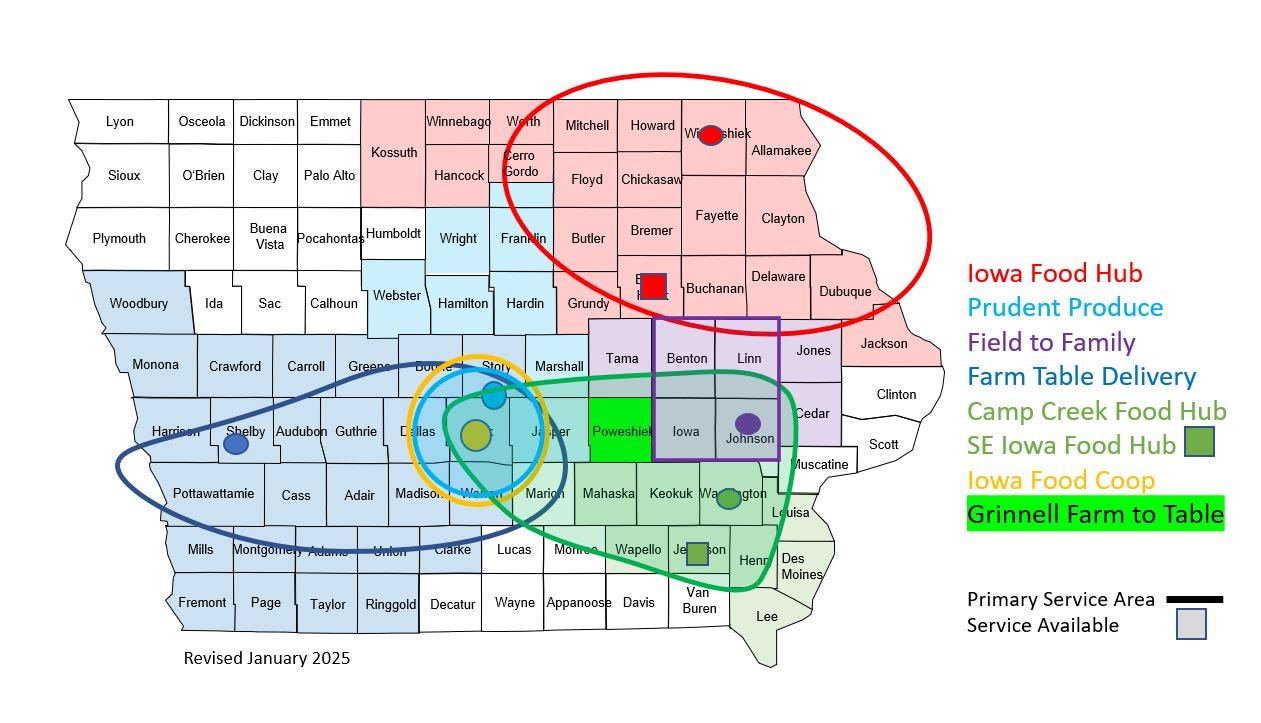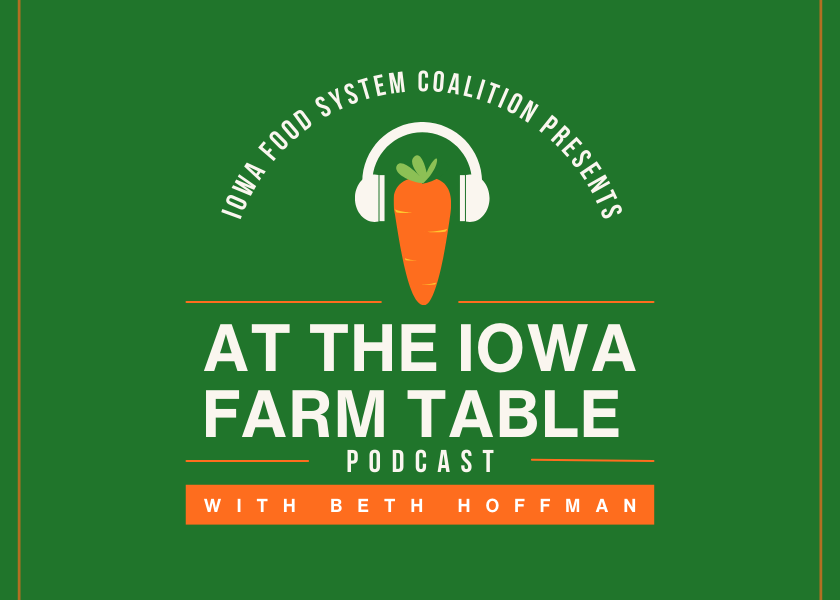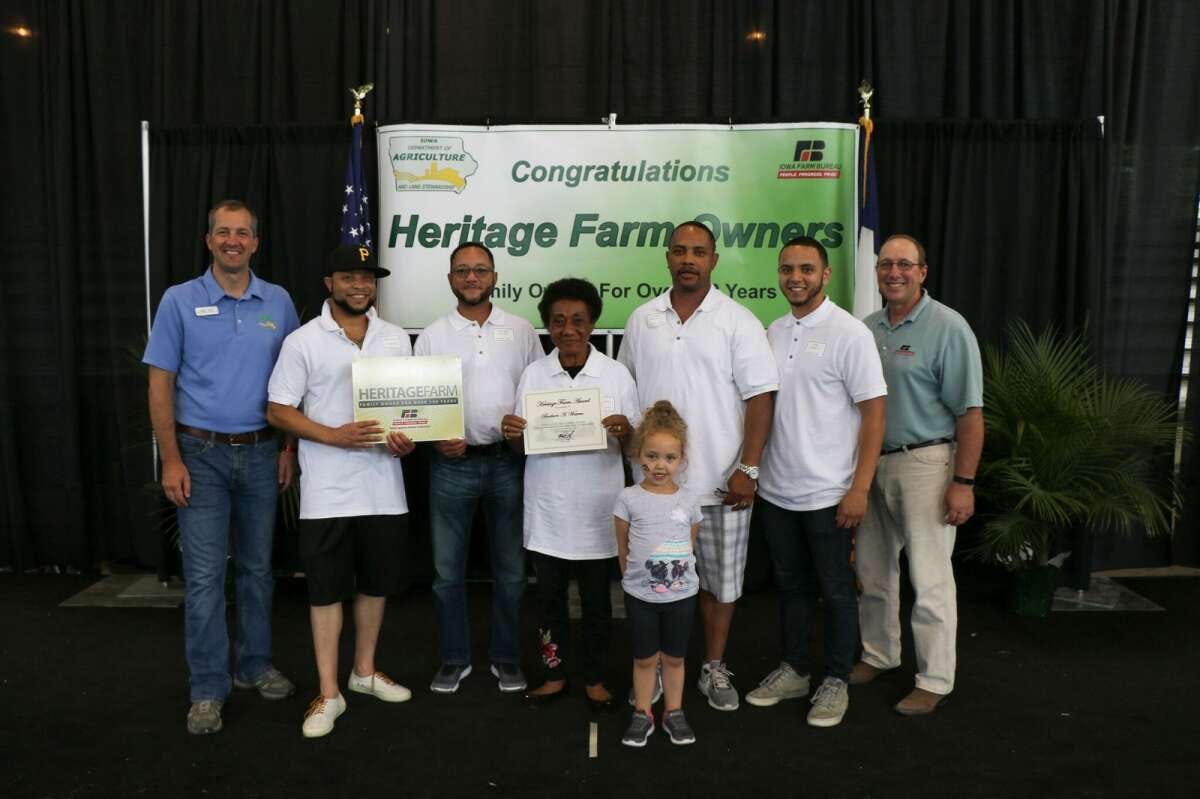Discover At the Iowa Farm Table Podcast
At the Iowa Farm Table Podcast

At the Iowa Farm Table Podcast
Author: From the Iowa Food System Coalition
Subscribed: 2Played: 37Subscribe
Share
© Iowa Food System Coalition
Description
The At the Iowa Farm Table Podcast takes a deep look into food and farming in Iowa. Brought to you by the Iowa Food System Coalition.
attheiowafarmtable.substack.com
attheiowafarmtable.substack.com
23 Episodes
Reverse
Fruits and vegetables are often not the first thing many SNAP (the Supplemental Nutrition Assistance Program) participants buy. Produce can be more expensive, and when you are trying to stretch food dollars to feed hungry kids (children make up almost 40% of all SNAP users), processed foods often fills more bellies.A program implemented in Iowa called Double Up Food Bucks helps stretch SNAP dollars by doubling the money spent on fresh fruits and vegetables. It’s a federally funded program active in Iowa for ten years now, and the federal and private funds spent on the program have successfully put more produce on the table.Yet also ten years old is the fight to get the state of Iowa to also contribute to the program. This year, the legislature is being asked to contribute $1 million of its $9.7 billion budget on the program, a contribution that would also be matched by the federal government.Thanks for reading At the Iowa Farm Table Podcast! Please subscribe to receive new episodes right to your inbox.It makes sense for Iowa to support the program. Double Up Food Bucks (DUFB) not only helps get produce into the homes of people on SNAP, it also supports local farmers. DUFB can be used at farmers markets or on Community Supported Agriculture (CSA) boxes purchased directly from farms. In several states, locally grown food has remained the focus, even as budgets have doubled. It is also good for Iowa’s economy—people who use it free up funds to spend on other important Iowa-owned businesses.Listen to this week’s episode of At the Iowa Farm Table to learn more about Double Up Food Bucks, the people who use the program, and why and how it helps get more fruits and vegetables into the hands of those who need it most.If you like this post, please “like” it! Comments are always encouraged too.VoicesNoah Stein—SNAP and Double Up Food Bucks participantJazzmine Brooks—Healthy Incentives Director at Iowa Healthiest StatePaige Chickering—Iowa State Manager for Save the Children Action NetworkNatalie Estrem—Market and Programs Supervisor at LSI Global GreensResourcesOnly 1 in 10 Adults Get Enough Fruits or VegetablesHealthy Incentives Pilot Final Evaluation ReportGusNIP Year 5 Impact FindingsSF 2027 (Double Up Food Bucks Appropriation Bill)At the Iowa Farm Table is brought to you by the Iowa Food System Coalition. Edited by Tommy Hexter. Brian Doubek and Ian Post created the music used in the show. This is a public episode. If you would like to discuss this with other subscribers or get access to bonus episodes, visit attheiowafarmtable.substack.com
“Food as medicine.” The phrase is everywhere in the news and on social media. But food and farming impacts not only our bodies. In this episode of At the Iowa Farm Table, we look at the concept of healing our bodies, by choosing better foods and by healing our soils.“If we’re going to have healthy people, we have to have healthy soils that produce healthy plants. That gives us healthy people,” says Shaffer Ridgeway, farmer and Soil Conservationist with the Natural Resources Conservation Service, the arm of the US Department of Agriculture that works directly with farmers to help them improve their soil health. Ridgeway will be part of a new Summit to be held in Iowa on March 2 + 3 in Cedar Falls, called Healing from the Ground Up. You can view the entire speaker lineup and register to attend at the webpage here.“The goal of this Summit is to create the social movement necessary to build the bridge between producers and consumers,” said Tommy Hexter, the IFSC Executive Director and one of event’s planners. “We will not only talk about the microbes in the soil, or the microbes in your stomach—we’ll also talk about how we get food from the farm to the table in Iowa, in a concerted effort. We all have to figure out how to work together.”Listen to this podcast that features some of the event’s speakers, discussing why and how healthy soil means healthier people.VoicesShaffer Ridgeway—Southern Goods FarmJenn Arndt—Roots Nutrition CounselingTommy Hexter—Iowa Food System CoalitionResourcesAn Alarming Decline in the Nutritional Quality of Foods: The Biggest Challenge for Future Generations’ HealthCorn Era Hybrid Macronutrient and Dry Matter Accumulation in Plant Components | Agronomy JournalThanks to Shaffer Ridgeway, Jenn Arndt and Tommy Hexter. And to Jodie Huegerich and Audrey Tran Lam for their thoughtful editing of this episode.Music by Beatfonics, Ian Post, and Mujo This is a public episode. If you would like to discuss this with other subscribers or get access to bonus episodes, visit attheiowafarmtable.substack.com
Working to change the food system can feel like a slog. Progress is slow, challenges are constant, and wins can be hard to see.And yet, change has happened. Public understanding has shifted, and a growing movement in Iowa is pushing toward a food system that is more sustainable, more equitable, and more accessible. That progress didn’t happen by accident. It happened because people showed up.In this episode, we reflect on the moments that inspire people to step into food systems work and to stay. Those moments come from many places: learning, frustration, love for the land, concern for future generations, or simply realizing that things don’t have to stay the way they are.This work isn’t a sprint or a marathon. It’s a relay race. Each person carries the baton for a while, shaped by those who came before and responsible to those who come next.When the work feels heavy, this conversation is a reminder that lasting change is built by people who keep showing up together.Resources* Find Your Legislators* Attend Advocacy Training Sessions (Fridays, February 13, 20, & 27)* Attend Iowa Food & Farm Day on the Hill (March 18, 2026)* Explore the Iowa Food System Coalition’s food and farm policy priorities for 2026Special thanks to Threase Harms, Luke Elzinga, Giselle Bruskewitz (Iowa Valley RC&D), Mallory DeVries, Jonathan Lawrence, Kate Gilbert, Chris Jones, and Matt Russell for sharing their time, insight, and inspiration in this episode. Mallory DeVries, Anrica Deb, and Tommy Hexter edited.Photography from Beth Hoffman, Whippoorwill Creek Farm This is a public episode. If you would like to discuss this with other subscribers or get access to bonus episodes, visit attheiowafarmtable.substack.com
In recognition of Indigenous Peoples Day (October 13th in Iowa), we hear from two Indigenous women residing in Iowa and learn how shifting our perspective can help bring us back into balance with the natural world. Featured Voices* Marianna G. M. Cota, MPH — Ecologist, dreamweaver, heartist, disruptor, folklorist, and public health scholar with Yoeme/Yaqui, Kapampangan/Filipino, and Mexican lineage. Marianna is the dreamer behind INDIGENEXUS, inviting others to develop and maintain relationships with the creative and spiritual aspects of their being.* Zine: Beauty All Around Us, a community-led project featuring indigenous youth perspectives.* Sikowis Nobiss, BA, MA — Founder of Great Plains Action Society, which addresses the trauma that Indigenous Peoples and the Earth face through community engagement, civic engagement, mutual aid, rematriation, and healing justice.* Nobiss works closely with the Honor Native Land Fund, an opportunity for non-Native people living in the Midwest to contribute to the rematriation of land to Indigenous stewardship. Through supporting land return, participants in HNLF acknowledge that we live on Indigenous homelands while taking practical steps toward repair. * You can also join the Decolonial Repair Network to dive deeper.Stay in the LoopStay connected to the latest in Iowa’s food system news. Subscribe to the Iowa Food System Coalition’s newsletter for timely news, action alerts, and event updates, all focused on supporting local farms and communities. Never miss a bite!🎧 Produced by the Iowa Food System Coalition. Edited by Mallory DeVries. This is a public episode. If you would like to discuss this with other subscribers or get access to bonus episodes, visit attheiowafarmtable.substack.com
Iowa’s food system has been engineered into sameness. This episode explores how diversification—of crops, markets, and farmers—could reshape the Corn Belt and prove that Food Grows Iowa. This is a public episode. If you would like to discuss this with other subscribers or get access to bonus episodes, visit attheiowafarmtable.substack.com
Iowa’s nitrate levels have hit historic highs, forcing lawn watering bans, swim advisories, and costly cleanups. A new report — the Central Iowa Source Water Research Assessment (CISWRA) — confirms what many Iowans already know: agriculture is driving the problem, and solutions can’t wait.So what can you do about a challenge this big?In this episode, host Beth Hoffman sits down with Dr. Adam Shriver, Director of Wellness and Nutrition at the Harkin Institute and leader with the Iowa Food System Coalition, to break down four concrete steps we can all start taking today.💡 The acronym is IDEA:* Inform — Learn the facts about water quality and share them in your community. Join groups already working on solutions.* Discover — Use free nitrate test kits to map water contamination through citizen science.* Eat — Support diverse, local farms by buying food directly from farmers and food hubs. Every purchase builds viable markets for change.* Ask — Landowners: include conservation practices in leases to protect soil and water for the long term.These aren’t quick fixes, but they’re real actions that create momentum for cleaner water, healthier communities, and stronger farms.🔗 Resources* CISWRA Report* Executive Summary* Additional Resources & Recordings* Izaak Walton League – Nitrate Watch program* Request a Kit* Iowa Food System Coalition* Setting the Table for All Iowans plan* Environmental Stewardship Chapter* Water Quality Groups* Practical Farmers of Iowa* Iowa Farmers Union* Iowa CCI* Iowa Environmental Council📬 Got an IDEA of your own? Share it with us! What’s happening in your corner of Iowa that can inspire others to keep going?Stay in the LoopStay connected to the latest in Iowa's food system news. Subscribe to our newsletter for timely news, action alerts, and event updates, all focused on supporting local farms and communities. Sign up today and never miss a bite!Thank you to Adam Shriver. Mallory DeVries edited. Meghan Holloran assisted media production. Music by Chris Schwartz and Lobo Loco. This is a public episode. If you would like to discuss this with other subscribers or get access to bonus episodes, visit attheiowafarmtable.substack.com
Cheese curds. Goat cheese. Ice Cream. Beverages.At the Iowa State Fair, the Iowa Quality Dairy Products Competition showcases the best dairy products in the state, from small family creameries to large-scale brands that are investing in Iowa.In this episode, we follow Heather Moore of Moore Family Farms in Maquoketa as she enters her cheese curds in one of the fair’s most competitive categories. We go behind the scenes at Iowa State University for judging day, hear from founder Stephanie Clark on how Iowa’s dairy industry is growing at both ends of the spectrum, and find out what this contest reveals about the future of farming in our state.Featured Voices* Heather Moore – Dairy farmer and cheesemaker at Moore Family Farms in Maquoketa, Iowa.* Stephanie Clark – Iowa State University Emeritus Professor of Food Science and Human Nutrition; founder of the Iowa Quality Dairy Products Competition.* Danielle Christofferson – Production Manager at the Iowa State Creamery and organizer of the dairy competition.Dairy Competition WinnersCultured Products* Hinterland Dairy Quark - Original* Hinterland Dairy Quark - Garlic & Herb* Woods, Zach French Onion DipCheese Curds* WW Homestead Dairy - White Cheddar Cheese Curds* Hinterland Dairy - Original Curds* WW Homestead Dairy - Pizza White Cheddar Cheese CurdsCow Milk Cheese* Hinterland Dairy - Hoppin' Jalapeno Cheddar* WW Homestead Dairy - Chipotle Morita* Hinterland Dairy - Brooks Place Aged Alpine CheddarGoat Milk Cheese* Korver, Justin - Cranberry Spice Swirl* Smith, Diana - Chevre* Smith, Diana - CheddarDairy Beverages* Country View Dairy - Chocolate Whole Milk* Woods, Zach - 1% Buttermilk* Woods, Zach - 36% Heavy Whipping CreamIce Cream/ Gelato* Country View Dairy - Muddy Buddy Frozen Yogurt* Korver, Justin - Wildberry Lemonade* Korver, Justin - ChocolateBest of ShowCountry View Dairy - Muddy Buddy Frozen YogurtStay in the LoopStay connected to the latest in Iowa's food system news. Subscribe to our newsletter for timely news, action alerts, and event updates, all focused on supporting local farms and communities. Sign up today and never miss a bite!Make the Iowa Local Food PromiseJoin Iowans across the state in committing a portion of your food budget to food grown right here in Iowa. The Iowa Local Food Promise is a simple way to support local farmers, strengthen our communities, and keep fresh, nutritious food on our plates. Make the Promise →Very special thanks this week to Danielle Christofferson, Stephanie Clark, Heather Moore, and the judges at ISU. Mallory DeVries edited. Meghan Holloran assisted media production. Music by Chris Schwartz and Lobo Loco. This is a public episode. If you would like to discuss this with other subscribers or get access to bonus episodes, visit attheiowafarmtable.substack.com
It starts showing up in parking lots and roadside stands around July. People rearrange their schedules to get it while it’s fresh. They stand in line, drive miles out of their way, and plan weekend gatherings around it. Some boil. Some grill. Some freeze a dozen bags for winter. Everyone has their way.It’s inconvenient. More labor-intensive than most foods we buy. And still, Iowans go out of their way for it, year after year.In this episode, we dig into the literal, emotional, and cultural layers of Iowa’s sweet corn obsession. We trace its history from Indigenous cultivation to a heyday of nearly 60 canning plants across the state. We hear how sweet corn helped one family farm stay afloat during the 1980s farm crisis. And we explore what its enduring popularity reveals about what eaters are willing to do (and spend) for food they believe in.With voices from the field—including longtime growers, young pickers, and food historian and author Darcy Maulsby—we ask: Could sweet corn be a gateway to a broader shift? One that reconnects Iowans to the land, to local food, and to one another?Featured Voices* Darcy Maulsby, author of A Culinary History of Iowa* Dan Denison, Dan-D Farms (Knoxville, IA)* Mallory DeVries, Healthy Harvest of North IowaResources* Grow. Eat. Play. Local Food Recipes & Resources* Sweet Corn Recipes, Healthy Harvest of North Iowa* Iowa State University Ag HistoryMake the Iowa Local Food PromiseJoin Iowans across the state in committing a portion of your food budget to food grown right here in Iowa. The Iowa Local Food Promise is a simple way to support local farmers, strengthen our communities, and keep fresh, nutritious food on our plates. Make the Promise →Story SponsorSpecial thanks to Healthy Harvest of North Iowa—not only a sponsor, but an IFSC partner in this story and the broader food system work. Together, we’re connecting the dots between producers, markets, and the people they feed.Stay in the LoopStay connected to the latest in Iowa's food system news. Subscribe to our newsletter for timely news, action alerts, and event updates, all focused on supporting local farms and communities. Sign up today and never miss a bite! This is a public episode. If you would like to discuss this with other subscribers or get access to bonus episodes, visit attheiowafarmtable.substack.com
In 2024, Governor Kim Reynolds made headlines when she declined $29 million in federal funding for Summer EBT (also known as SUN Bucks)—a proven program that helped feed nearly 250,000 Iowa kids each summer. Instead, the state applied for a waiver to pilot its own approach: Healthy Kids Iowa. While that waiver was denied under the previous administration, it gained approval this year under USDA Secretary Brooke Rollins.In this episode, we unpack what Healthy Kids Iowa looks like on the ground. We speak with pantry leaders, parents, and advocates to understand how this new model is actually playing out across Iowa. Has it truly expanded access and autonomy? How is it working for the volunteers and pantries tasked with distribution? Are families receiving food in ways that meet their needs?And—importantly—what’s in the box?Featured Voices* Missy Loux, First Lutheran Food Pantry* Christina Romp, Healthy Kids Iowa recipient* Paige Chickering, Save the Children Action NetworkDig Deeper* Map the Meal Gap (Feeding America)* Summer EBT: Nutritious Food For Iowa’s Kids (Iowa Hunger Coalition)* I am thrilled to announce with Secretary Rollins Iowa’s new summer food program, Healthy Kids Iowa! (Governor Kim Reynolds)* SNAP Map (Iowa Hunger Coalition)Take ActionIowa families deserve access to fresh, healthy food and the ability to choose what works best for them. Here’s how you can support real solutions to summer hunger:* Urge lawmakers to reinstate Summer EBT in 2026: This proven, efficient program helped feed nearly 250,000 Iowa kids each summer. It’s time to bring it back.* Support Double Up Food Bucks: This statewide program matches SNAP dollars spent on fruits and vegetables at farmers markets and grocery stores—making healthy food more affordable while supporting Iowa farmers.* Build your advocacy skills* Join the Save the Children Action Network (SCAN) for their Iowa State Advocacy Summit on Saturday, July 26 in Des Moines. This free event brings together advocates from across the state to learn about the issues facing children and families in Iowa—and how to speak up for solutions that work. Register >* Explore IFSC’s Legislative Priorities: From food access to farm resilience, learn what the Iowa Food System Coalition is advocating for and how you can get involved. Learn More>* Come see us at the Iowa Hunger Summit! This Wednesday, July 16, we’re hosting a breakout session: Networking Iowa’s Community-Based Food Groups (Co-hosted by Center for Rural Affairs, Iowa Farmers Union, and IFSC).* Make the Iowa Local Food Promise—Join the Iowa Food System Coalition by pledging a portion of your food budget to be spent on local food this summer.* Share this episode with your friends, family, and neighbors.Stay in the LoopStay connected to the latest in Iowa's food system news. Subscribe to our newsletter for timely news, action alerts, and event updates, all focused on supporting local farms and communities. Sign up today and never miss a bite!Special thanks to Christina Romp, Paige Chickering, Missy Loux, and Luke Elzinga. Mallory DeVries edited. Music by Chris Schwartz and Lobo Loco. This is a public episode. If you would like to discuss this with other subscribers or get access to bonus episodes, visit attheiowafarmtable.substack.com
Nitrate levels in Des Moines' drinking water are hitting historic highs. The city just issued its first-ever lawn watering ban, and rural communities are struggling too. What’s going on?In this episode, we revisit that grade school water cycle diagram—then rip it up. Because the reality in Iowa is very different. Think monocrops, fertilizer runoff, and millions of acres of buried tile lines rerouting water away from where it needs to go.We talk with Iowa’s State Geologist Keith Schilling and Iowa Farmers Union President Aaron Lehman about how industrial ag broke the natural flow of water—and we can help fix it. It’s not just about science. It’s about systems.And yes, you can do something. Starting with what’s on your plate.Voices* Keith Schilling: State geologist and director of the Iowa Geological Survey* Aaron Lehman: Farmer and President of the Iowa Farmers Union (Disclosure: Host Beth Hoffman is a member of the Iowa Farmers Union Board of Directors)Nitrate Watch MapNitrate Watch is a crowd-sourced community science project of the Izaak Walton League of America. This program mobilizes volunteers across the country to monitor nitrate levels in surface water (rivers, lakes, streams) and drinking water. The goals of Nitrate Watch are to raise awareness about the impacts of nitrates on the environment and human health, identify hotspots of nitrate pollution, and advocate for solutions that reduce nutrient pollution. Interactive Map >Dig Deeper* Fertilizer sales rose in 2024, but researchers say farmers are getting more efficient* Nitrate in Drinking Water: A Public Health Concern for All Iowans (Iowa Environmental Council)* Iowans Across the State Asked To Conserve Water Due to Dry Wells-High Nitrate Levels (Iowa Capital Dispatch)* Excess fertilizer use: Which countries cause environmental damage by overapplying fertilizers? (Our World in Data)* Can we reduce fertilizer use without sacrificing food production? (Hannah Ritchie)* Over-application of Fertilizer on Iowa’s Farm Fields – Although Fertilizer is Expensive, Farmers are Indeed Wasting It (Sierra Club, Iowa Chapter)* How Agricultural Runoff Contaminated One of Iowas Main Water Sources (Dave Hage and Josephine Marcotty)* Drinking Water Nitrate and Human Health: An Updated Review* Are central Iowa's growing data centers causing the water crisis? Here's what to know* Clean Water Act History* Watch recordings from workshops hosted by the Environmental Health Matters Initiative (EHMI) explored what actions can be taken on several levels to address the nitrogen contamination problem. Watch Now>Take Action* Make the Iowa Local Food Promise—Join the Iowa Food System Coalition by pledging a portion of your food budget to be spent on local food this summer.* Press your legislators to fund conservation programs and support diversified farming practices—technical assistance is stretched too thin right now. Our partners at the Iowa Environmental Council supports policy change to:* Expand state water monitoring, including groundwater monitoring.* Improve state and local water use and hazard mitigation planning.* Institute restrictions on industrial water use and siting.* Share this episode with your friends, family, and neighbors. Talking about water is urgent and now, it's personal.Stay in the LoopStay connected to the latest in Iowa's food system news. Subscribe to our newsletter for timely news, action alerts, and event updates, all focused on supporting local farms and communities. Sign up today and never miss a bite!Special thanks to Keith Schilling and Aaron Lehman for sharing their expertise, and to Mallory DeVries and Chris Schwartz for editing. Music by Mixxmaster_TAB. This is a public episode. If you would like to discuss this with other subscribers or get access to bonus episodes, visit attheiowafarmtable.substack.com
"Local food" is a popular idea. But why is it important to buy food grown locally? In this episode, we dive deeply into what local food really means and why it matters more than you might think. Spoiler alert: it has a lot to do with your health. But, it goes beyond nutrition. From farmers markets in small towns to food science labs, we explore how the way food is grown affects its flavor, nutrition, and even your connection to the people who grew it. It isn’t just fresher… it’s personal. It’s political. And it’s packed with potential.You can put your dollars where your values are.Resources* Iowa Local Food Promise—Join the Iowa Food System Coalition by pledging a portion of your food budget to be spent on local food this summer.* The Bionutrient Institute’s Beef Study* What Does “Local” Really Even Mean?—Healthy Harvest of North Iowa’s Grow. Eat. Play. explores the question.* Food, Nutrition, & Health—Explore IFSC’s chapter on the connection between local foods and wellbeing.Subscribe for free to receive At the Iowa Farm Table straight to your inbox.Featured Voices* Ashley Kaldenberg—KaldenBlooms—Albia, Iowa* Dr Stephan van Vliet—a nutrition scientist with metabolomics expertise in the Center for Human Nutrition Studies at Utah State University. His research is performed at the nexus of agricultural and human health. He collaborates with farmers, ecologists, and agricultural scientists to study critical linkages between agricultural production methods, the nutrient density of food, and human health. His work has been published in the American Journal of Clinical Nutrition, Scientific Reports, the Journal of Nutrition, and the Journal of Physiology.Stay in the LoopStay connected to the latest in Iowa's food system news. Subscribe to our newsletter for timely news, action alerts, and event updates, all focused on supporting local farms and communities. Sign up today and never miss a bite! This is a public episode. If you would like to discuss this with other subscribers or get access to bonus episodes, visit attheiowafarmtable.substack.com
For this episode we visited our partners at the Des Moines Area Religious Council (DMARC) food pantry network, where collaboration, data collection, and advocacy are changing how food insecurity is understood and addressed. We hear how local pantries work, who they serve, and why even in a state known for agriculture, one in four Iowans is struggling to access enough food.This episode also examines how cuts to programs like LFPA and the underfunding of Iowa’s Choose Iowa Purchasing Pilot threaten progress that supports both farmers and families.Resources* Food insecurity rises in Iowa; 385,000 residents face hunger* Iowa SNAP Work Rules* How SNAP cuts will impact your stateVoices in this episode:* Helen Bell – DMARC pantry volunteer* Blake Willadsen – Communications Manager, DMARC* Luke Elzinga – Policy and Advocacy Director, DMARC and Chair of the Iowa Hunger CoalitionCall to Action:Food insecurity doesn’t start or end at the pantry door. We need policies that address the root causes of hunger — and investments that connect Iowa farmers directly to Iowa families.* Support organizations like DMARC and the Iowa Hunger Coalition.* Share this episode to help spark conversations about real solutions to food insecurity.* Stay engaged as an advocate for policies that value both people and local food producers. This is a public episode. If you would like to discuss this with other subscribers or get access to bonus episodes, visit attheiowafarmtable.substack.com
So much of the food we eat is grown, processed, and prepared by people we rarely see. Many of them are immigrants and refugees. In this episode, we hear from Iowans whose lives and work are deeply woven into the fabric of our food system and explore what it means to search for safety, stability, and opportunity in a country that sends mixed messages.Thanks for listening to the At the Iowa Farm Table Podcast! Subscribe for free to receive new episodes to your inbox.Voices* Alex – aspiring farmer and refugee from the Democratic Republic of Congo* Valerie Lacarte – Senior Policy Analyst, Migration Policy Institute* Maria Torres – community leader, Pottawattamie County Public Health* Yves Fleurima – Haitian immigrant and advocate, WaterlooResources* Latinos in Iowa, 2024 - Iowa Data Center* Migrants in Iowa - Migrant Policy Institute* The Essential Role of Immigrants in the U.S. Supply Chain (infographic) - Migrant Policy Institute* The Hidden Costs of Trump's Mass Deportations -Wall Street Journal (Video)* State Immigration Profiles: Iowa - Migrant Policy InstituteAbout Our Labor Equity TeamThe Iowa Food System Coalition’s Labor Equity team is working to strengthen Iowa’s food system workforce through skill-building, fair compensation, and safe, equitable work environments. Our goal is to uplift ALL workers; especially those historically impacted by unjust labor policies and to ensure that every job in the food system is a job worth having.Dig DeeperIowa immigrant group is alarmed by a state lawmaker’s demand for confidential information | AP NewsAmid fear and nonprofit closure, immigrants need services in Pottawattamie County | KMTV OmahaPottawattamie County Public Health’s Maria Torres Honored with Awards for Community Impact | Pottawattamie County Public Health‘We are not illegal humans’: Hundreds march in Iowa City in support of immigrants | Little Village MagazineStay in the LoopStay connected to the latest in Iowa's food system news. Subscribe to our newsletter for timely news, action alerts, and event updates, all focused on supporting local farms and communities. Sign up today and never miss a bite! This is a public episode. If you would like to discuss this with other subscribers or get access to bonus episodes, visit attheiowafarmtable.substack.com
Listen Now | What does it mean to add value on the farm and why does it matter? In this episode, we explore how Iowa farmers are going beyond raw products to create products that feed their communities, build resilience, and keep more food dollars close to home.This kind of work is getting a boost from the Choose Iowa Value-Added Grant Program, which recently awarded $463,000 to farmers and food businesses across the state. That funding is expected to spark over $1 million in local investment. Demand for the program beat funding 4-to-1, showing just how many great ideas are waiting in the wings. That’s why we’re pushing to grow the program and back every bold step Iowa farmers want to take.🎧 Like what you hear? Subscribe to At the Iowa Farm Table and bring more local food stories to your ears.VoicesJeff Hafner—Early Morning HarvestMark Westbrock—Solstice Farm and Paha CiderSavanah Laur—Practical Farmers of IowaReferencesIowa State researchers help lead multistate project for a more diverse Corn Belt—Iowa State UniversitySecretary Naig Awards 33 Choose Iowa Value-Added Grants—Official State of Iowa WebsiteUSDA Food Dollar Series—Note: The Food Dollar shows the farm share at 15.9 cents of the dollar. In an email exchange with Beth Hoffman, USDA clarified that half that amount is spent by farmers on inputs (seed, herbicides, etc), leaving farmers with only 8 cents of every dollar.Music* Mom n' Pa by Beat Mekanik - licensed under a Attribution 4.0 International License.* Coalition Call by Chris Schwartz IFSCStay in the LoopStay connected to the latest in Iowa's food system news. Subscribe to our newsletter for timely news, action alerts, and event updates, all focused on supporting local farms and communities. Sign up today and never miss a bite! This is a public episode. If you would like to discuss this with other subscribers or get access to bonus episodes, visit attheiowafarmtable.substack.com
Listen Now | In 2012, Rob Faux was bringing water out to the hens on his organic farm in northeast Iowa when a plane flew over and sprayed pesticides on him, his partner, and his farm. Not once, but twelve times.The experience of that day and the weeks and months after it led him to become who he is today: an advocate for pesticide control and regulation.In today’s episode of At the Iowa Farm Table, Beth Hoffman of the Iowa Food System Coalition dives into Rob Faux’s shocking story and what the new “pesticide immunity” laws creeping up around the country could mean for us all.You can listen to this and every episode of At the Iowa Farm Table wherever you listen to podcasts (ie—Spotify, Apple, etc).Subscribe for free to receive At the Iowa Farm Table straight to your inbox.Featured VoicesRob Faux – diversified organic farmer in northeast Iowa, pesticide‑drift survivor, and Iowa Communications Manager for Pesticide Action & Agroecology Network (PAN) North America)Key Episode Insights* A negligent crop‑dusting event wiped out Faux’s crops and sparked his fight for stricter pesticide rules.* Proposed “immunity” bills would stop farmers and cancer patients from suing, even when labels intentionally hide risks.* Today, Faux is a cancer survivor. But like many, where his cancer originated from is unknown. In Iowa, there are no laws mandating farmers to alert neighbors as to which chemicals will be sprayed or when. Iowa is also one of the most heavily sprayed places on earth.* Iowans across party lines want companies to be held accountable for land, water, and human health.Resources & Action* Bills to track by state* Pesticide Action & Agroecology Network (PAN) North America – campaigns, science briefs, action alerts, resources:.* Iowa Food System Coalition* 2025 Policy Asks* Newsletter Sign-Up* Find Your Iowa Legislator – quick lookup & contact info* Roundup/Cancer Trial Tracker – ongoing litigation statistics (U.S. Right to Know)News & Media* Iowa House declines to advance bill shielding pesticide companies from cancer lawsuits—IPR* 30+ Groups To Iowa House: Stop Cancer Gag Act—Food & Water Watch Iowa* Farmer raises concern over bill exempting pesticide companies from lawsuits—KCRG* Bayer moves to block lawsuits that claim glyphosate causes cancer—Chemical and Engineering NewsThanks for reading At the Iowa Farm Table Podcast! Subscribe for free to receive new posts and support my work. This is a public episode. If you would like to discuss this with other subscribers or get access to bonus episodes, visit attheiowafarmtable.substack.com
This week, we explore the innovative world of Iowa’s food hubs—those central engines that aggregate, coordinate, and distribute locally grown food to schools, hospitals, retailers, and consumers. Iowa's Hub to Hub network, galvanized by federally funded programs like Local Food for Schools (LFS) and Local Food Purchasing Assistance (LFPA), streamlined the journey from farm to table. Now federal funding has been cut— but customers continue to benefit from the network, buying local, vetted products they can’t get at the grocery store.In this episode, the Iowa Food System Coalition discusses how these hubs work together—rather than competing—to create a reliable supply chain. And why support from the ground up—from consumers and institutions to state programs like Choose Iowa Purchasing—is essential now that federal funding has ended.Featured Voices* Tommy Hexter, Owner of Grinnell Farm to Table* Karen Davis, General Manager of the Iowa Food Cooperative* Victoria HarrisKey Episode Insights* How federal funding like LFS and LFPA helped fuel the growth of our food hubs and the formation of the hub-to-hub network* Why Iowa’s network is a unique collaborative of Iowa’s food hubs, coordinating routes and pooling resources to maximize efficiency* What are the challenges ahead as federal funding has ceased, and the potential role of a state-backed Choose Iowa Purchasing Program to bridge the gap* What you can do to helpTake Action Now* Contact Legislators Tell them: Invest $3 million in Choose Iowa to replace lost federal funds and strengthen Iowa’s local food economy.* Agriculture and Natural Resources Appropriations Subcommittee (J)Senate Members* Senate Approps Chair Sen. Tim Kraayenbrink* Tom Shipley (R, District 9), Chair* Annette Sweeney (R, District 27), Vice Chair* Art Staed (D, District 40), Ranking Member* Mike Zimmer (D, District 35)* Dan Zumbach (R, District 34)House Members* House Approps Chair Rep. Gary Mohr* Norlin G. Mommsen (R, District 70), Chair* Helena Hayes (R, District 88), Vice Chair* Sami Scheetz (D, District 78), Ranking Member* Sean Bagniewski (D, District 35)* Chad Behn (R, District 48)* J.D. Scholten (D, District 1)* Craig Steven Williams (R, District 11)* Devon Wood (R, District 17)* Derek Wulf (R, District 76)* Call Governor Reynolds: (515) 281-5211 | Contact Form* Tell her to support investment of $3 million in Choose Iowa to replace lost federal funds and strengthen Iowa’s local food economy.* Engage with Your Local Institutions* Ask schools, hospitals, and grocery stores about their food sourcing practices and advocate for local purchasing.* Find a hub near you and plan to make local food purchasing part of your everyday.Resources & Links* Iowa Food Hub Directory* Iowa Food Systems CoalitionWe Want to Hear From You: How do you support local food in your community? Share your stories and tips on buying local, and we may feature your insights in upcoming episodes. Email us your experiences and ideas!* communications@iowafoodsystemcoalition.org This is a public episode. If you would like to discuss this with other subscribers or get access to bonus episodes, visit attheiowafarmtable.substack.com
School lunch is about so much more than tater tots and chocolate milk. In this episode, you’ll discover how local food in schools not only improves nutrition for kids, but also fuels Iowa’s economy, supports independent farmers, and strengthens rural communities.You’ll hear what made the now-defunded Local Food for Schools (LFS) program so successful and why proposed legislation like SF 525 threatens to undo that progress. We dig into what’s at stake and what you can still do to protect real food and real farms in Iowa.[You can read the transcript below.]Featured Voices:* Jessy Sadler – Food Service Director, Urbandale Schools* Julie Udelhofen – Food Service Director, Clear Lake Schools* Chelsea Krist – Farm to School and Early Care Specialist on Iowa State Extension's Farm, Food and Enterprise Development Team* Teresa Wiemerslage – Local Food Systems Specialist, ISU Extension* Chris Schwartz – Executive Director, Iowa Food Systems CoalitionTake Action Now1. Support the Choose Iowa Food Purchasing ProgramAsk the Agriculture & Natural Resources Appropriations Subcommittee to invest $3 million in the Choose Iowa Food Purchasing Program to replace lost federal funding and strengthen Iowa’s local food economy.📞 Senate Switchboard: (515) 281-3371📞 House Switchboard: (515) 281-3221Senate Subcommittee Members:* Sen. Tom Shipley (R, District 9) – Chair* Sen. Annette Sweeney (R, District 27) – Vice Chair* Sen. Art Staed (D, District 40) – Ranking Member* Sen. Mike Zimmer (D, District 35)* Sen. Dan Zumbach (R, District 34)House Subcommittee Members:* Rep. Norlin G. Mommsen (R, District 70) – Chair* Rep. Helena Hayes (R, District 88) – Vice Chair* Rep. Sami Scheetz (D, District 78) – Ranking Member* Rep. Sean Bagniewski (D, District 35)* Rep. Chad Behn (R, District 48)* Rep. J.D. Scholten (D, District 1)* Rep. Craig Steven Williams (R, District 11)* Rep. Devon Wood (R, District 17)* Rep. Derek Wulf (R, District 76)—Also Contact:* Sen. Tim Kraayenbrink – Senate Appropriations Chair* Rep. Gary Mohr – House Appropriations Chair2. Oppose SF 525: Contact All State Senators NOWSF 525 threatens to rewrite school nutrition standards to favor commodity crops like corn, pork, and dairy—prioritizing corporate profits over kids’ health and local food access. It could also jeopardize federal funding for school meals.📞 Call your Senator today and urge them to vote NO on SF 525.🔍 Find your Senator: Iowa Legislature Contact Page📚 Resources & Links:* Iowa Food Systems Coalition* Procurement Team* Policy Team* Choose Iowa Food Purchasing Program (School applications open until April 7)* Iowa Local Food for Schools (LFS)* Find Your Iowa Legislator* 2024 Choose Iowa Food Purchasing Pilot ReportSwarm of Birds (ID 1835) by Lobo Loco is licensed under a Attribution-NonCommercial-ShareAlike 4.0 International License.Music also by Chris SchwartzTranscriptSchool Lunch ScriptThis is At the Iowa Farm Table Podcast, brought to you by the Iowa Food Systems Coalition. I am your host, Beth Hoffman.I’ve reported on food and agriculture a long time, but I’ve never done a story about school lunch. It seemed, well kind of boring to be honest, a lot of talking heads going on nutrition and cost. And politics, so many politics around school lunch. And there is gobs of that, as we will see in this episode. The Trump Administration and the Iowa legislature are dramatically impacting school lunch as I speak.But I was surprised to learn why that mattered so much. School lunch, I learned and you will too in this episode, is a major economic driver, a massive lesson in logistics, and a place to celebrate some pretty amazing people.hanks to the Iowa State Extension’s Farm, Food and Enterprise Development Team. Mallory DeVries edited this piece and Chris Schwartz and Lobo Loco wrote the music. I’m Beth Hoffman with the Iowa Food System Coalition. Thanks for listening. This is a public episode. If you would like to discuss this with other subscribers or get access to bonus episodes, visit attheiowafarmtable.substack.com
The Iowa Food System Coalition had a great idea: to start a podcast featuring our amazing partners (there are more than 40 of them!) and to dive into the topics we care about. So here it is—the first episode, explaining a little bit about why Iowa is so important when we think about farming in America and how we can improve agriculture here and elsewhere.Please share widely and let us know your thoughts! For more information on the Iowa Food System Coalition, please visit our website.Subscribe to our newsletter for timely news, action alerts, and event updates, all focused on supporting local farms and communities. This is a public episode. If you would like to discuss this with other subscribers or get access to bonus episodes, visit attheiowafarmtable.substack.com
Todd Western III’s family settled in Mahaska County in 1864, a year after Abraham Lincoln issued his famous Emancipation Proclamation. More than 160 years later, the family still farms the same land.As one would imagine, the Western family has weathered a lot over the course of their time on the land: price fluctuations, weather changes, and racial discrimination. But it was the sudden death of Western’s father that changed the course of his life and allowed him to find his calling.Listen to Western tell the story of his family and how his passion for agriculture spurred him on to form the Iowa Farmers of Color.Voices:Todd Western III — Iowa Farmer and Senior Donor Advisor at Greater Twin Cities United WayResources:You can find more information about the Iowa Farmers of Color at:* https://www.iowafarmersofcolor.com/* https://www.facebook.com/profile.php?id=61564629460814* Instagram - @iowafarmersofcolorYou can learn more about the class action suit against the US Department of Agriculture by Black Farmers (Pigford v Glickman) here.Stay in the LoopStay connected to the latest in Iowa’s food system news. Subscribe to the IFSC newsletter for timely news, action alerts, and event updates, all focused on supporting local farms and communities. Sign up today and never miss a bite!🎧 Produced by the Iowa Food System Coalition. Edited by Tommy Hexter. This is a public episode. If you would like to discuss this with other subscribers or get access to bonus episodes, visit attheiowafarmtable.substack.com
There’s a word that explains a lot about modern agriculture, even if Merriam-Webster hasn’t caught up yet: chickenization. It’s what happens when animals become “widgets,” farms become factories, and power quietly shifts from thousands of farmers to a handful of corporations.In this season finale of At the Iowa Farm Table, Beth Hoffman digs into how chicken went from luxury to dollar-menu staple, and what we lost along the way. Journalist and author Christopher Leonard traces the rise of vertically integrated poultry and the contract system that keeps farmers under someone else’s thumb. Former U.S. Senator Tom Harkin reflects on how federal policy helped supercharge “efficiency,” and what that really cost rural communities.Then we head back to the Midwest to meet two very different kinds of poultry operations charting another path.We won’t solve chickenization in a 20 minute podcast. But we do ask a pointed question: if cheap meat comes with sick soils, hollowed-out towns, and stressed-out farmers, is it really efficient?Voices* Senator Tom Harkin—The Harkin Institute* Christopher Leonard—The Meat Racket, @cleonardnews, watchdogwritersgroup.com (watch full interview here)* Jason Grimm—Grimm Family Farm* Reginaldo Haslett-Marroquin—Tree Range Farms (watch full interview here)Resources* New Study Highlights Benefits of the Partnership Between Contract Farmers and Chicken Companies—National Chicken Council* 2024 Americans’ Views on Business Survey* The Cost of Money and Commercial Poultry GrowingSpecial thanks to our guests Christopher Leonard, Tom Harkin, Jason Grimm, and Reginaldo Haslett-Marroquin for their insight. And to Mallory DeVries and Anrica Deb for their thoughtful editing throughout this episode. Thanks to Meghan Holloran for supporting our social media and promotional work this season. This is a public episode. If you would like to discuss this with other subscribers or get access to bonus episodes, visit attheiowafarmtable.substack.com



